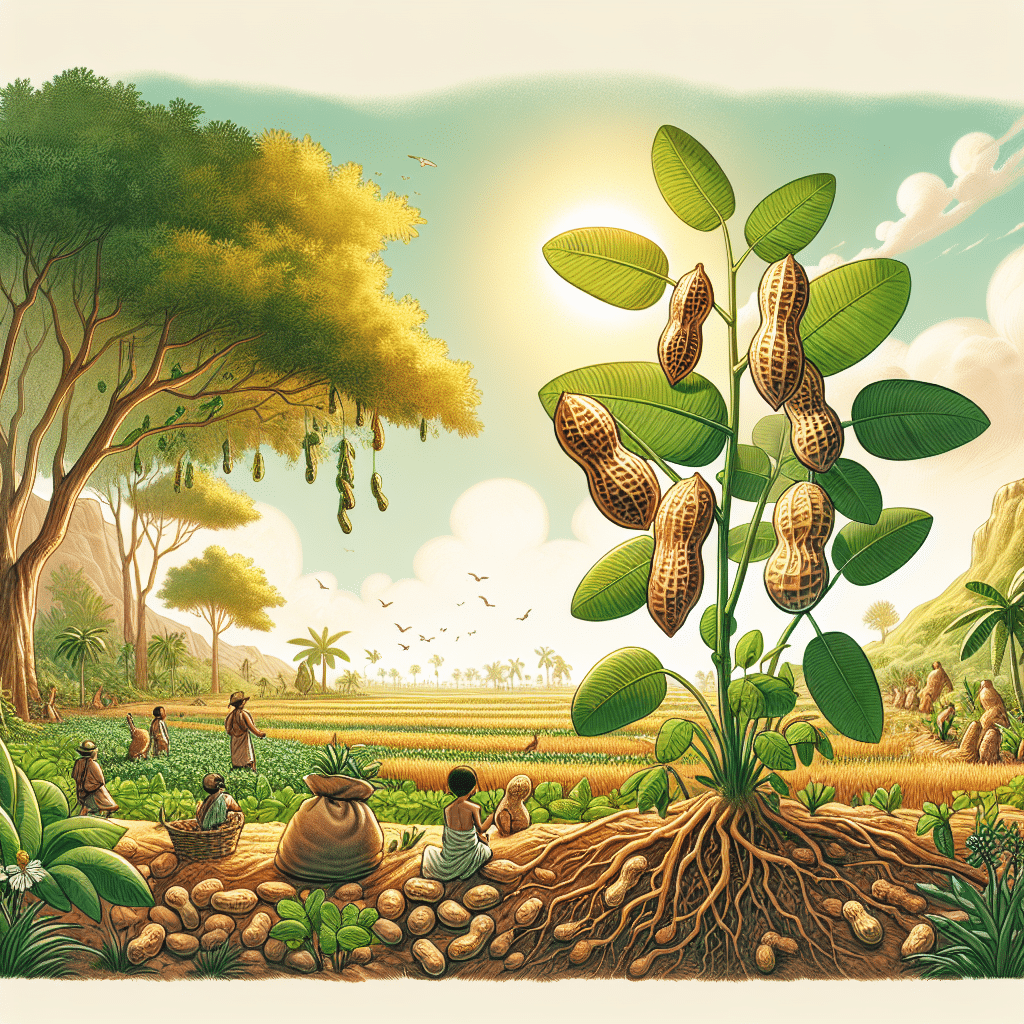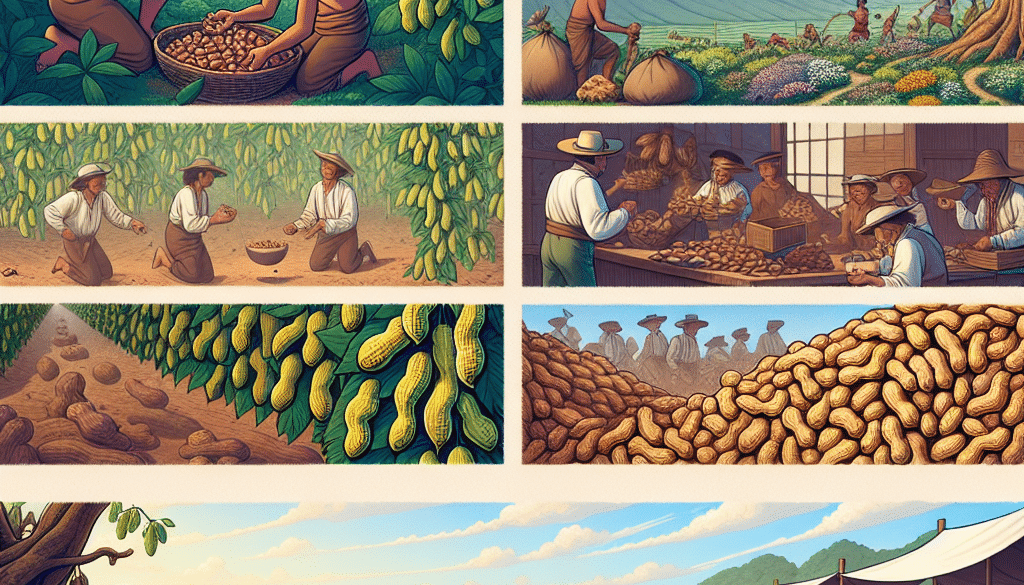Are Peanuts Native to America: Origin Story
-
Table of Contents
- Peanuts: Unearthing the American Origin Story
- The Ancestral Roots of Peanuts
- Spreading Roots: Peanuts in North America
- The Rise of the Peanut Industry in America
- Peanuts in Modern America: Cultural and Economic Significance
- Conclusion: The American Peanut Legacy
- Discover the Power of Plant Proteins with ETprotein
Peanuts: Unearthing the American Origin Story

Peanuts, those ubiquitous legumes that find their way into our snacks, sandwiches, and cuisines, have a rich history that is deeply intertwined with the cultural and agricultural tapestry of America. But are peanuts truly native to this continent, or is their origin story rooted in far-off lands? This article delves into the fascinating journey of peanuts from their ancestral homes to the fields of America, exploring their impact on societies, economies, and cultures along the way.
The Ancestral Roots of Peanuts
Contrary to popular belief, peanuts (Arachis hypogaea) are indeed native to South America, specifically to regions that are now part of Bolivia and Argentina. The legume’s journey began thousands of years ago, where it was first cultivated by ancient South American civilizations. Archaeological evidence suggests that peanuts were domesticated as far back as 7,600 years ago, with remnants found in Peruvian excavation sites.
- Pre-Columbian Trade: Peanuts were traded among indigenous peoples, spreading throughout the continent.
- Cultural Significance: In ancient cultures, peanuts were revered for their nutritional value and were often associated with religious and burial practices.
- Agricultural Innovation: Early cultivators developed sophisticated farming techniques to grow and harvest peanuts, which would later influence agricultural practices in North America.
Spreading Roots: Peanuts in North America
With the arrival of European explorers and the subsequent Columbian Exchange, peanuts were transported across the Atlantic, where they found new homes in Africa and Asia. However, it wasn’t until the 1700s that peanuts made a significant comeback to North America, this time through the transatlantic slave trade. Enslaved Africans brought with them knowledge of peanut cultivation, which they introduced to North American soil.
- Colonial Plantations: Peanuts were initially used as a food source for enslaved people on plantations.
- Civil War Influence: The Civil War played a pivotal role in popularizing peanuts as soldiers from both sides consumed them as a protein-rich food source.
- Post-War Expansion: After the war, peanuts became a staple crop in the southern United States, leading to the rise of peanut farming and industry.
The Rise of the Peanut Industry in America
The late 19th and early 20th centuries marked a turning point for peanuts in America. With the advent of new machinery and the ingenuity of figures like George Washington Carver, peanuts transformed from a regional crop to a national industry.
- George Washington Carver: Known as the “Peanut Man,” Carver developed over 300 uses for peanuts, promoting their versatility and nutritional value.
- Technological Advancements: Innovations in peanut harvesting and processing made the crop more profitable and accessible.
- Economic Impact: The peanut industry became a significant economic driver in the southern United States, providing jobs and contributing to regional development.
Peanuts in Modern America: Cultural and Economic Significance
Today, peanuts are an integral part of American culture and cuisine. From peanut butter to ballpark snacks, they are a beloved feature of the American dietary landscape. The United States is among the leading producers of peanuts, with Georgia, Texas, and Alabama being top peanut-growing states.
- Nutritional Benefits: Peanuts are a source of protein, healthy fats, vitamins, and minerals, contributing to their popularity in health-conscious diets.
- Economic Contributions: The peanut industry supports thousands of jobs and generates billions of dollars in economic activity annually.
- Cultural Icon: Peanuts have become a cultural icon, featured in everything from classic comic strips like “Peanuts” to being a staple in American sports and entertainment.
Conclusion: The American Peanut Legacy
In conclusion, while peanuts are not native to North America, they have become an inseparable part of the continent’s agricultural and cultural identity. Their journey from South America to the global stage is a testament to the power of agricultural exchange and innovation. Peanuts have not only enriched diets but have also played a pivotal role in shaping economies and societies. The story of peanuts is a narrative of resilience, adaptation, and growth, reflecting the broader story of America itself.
Discover the Power of Plant Proteins with ETprotein
As we celebrate the rich history and nutritional value of peanuts, it’s important to recognize the growing demand for plant-based proteins. ETprotein is at the forefront of this movement, offering a wide range of high-quality, organic plant proteins that cater to various industries and dietary needs. Whether you’re looking for peanut protein or other plant-based alternatives, ETprotein’s products are designed to meet the highest standards of taste, purity, and nutritional value.
Embrace the benefits of plant proteins and explore ETprotein’s offerings to enhance your food products, supplements, or personal health regimen. With a commitment to excellence and customer satisfaction, ETprotein is your go-to source for all your protein needs.
About ETprotein:
ETprotein, a reputable protein Chinese factory manufacturer and supplier, is renowned for producing, stocking, exporting, and delivering the highest quality organic bulk vegan protein and plant proteins. They include Organic rice protein, clear rice protein, pea protein, clear pea protein, pumpkin seed protein, sunflower seed protein, mung bean protein, peanut protein etc. Their offerings, characterized by a neutral taste, non-GMO, allergen-free attributes, cater to a diverse range of industries. They serve nutraceutical, pharmaceutical, cosmeceutical, veterinary, as well as food and beverage finished product distributors, traders, and manufacturers across Europe, USA, Canada, Australia, Thailand, Japan, Korea, Brazil, and Chile, among others.
ETprotein specialization includes exporting and delivering tailor-made protein powder and finished nutritional supplements. Their extensive product range covers sectors like Food and Beverage, Sports Nutrition, Weight Management, Dietary Supplements, Health and Wellness Products, and Infant Formula, ensuring comprehensive solutions to meet all your protein needs.
As a trusted company by leading global food and beverage brands and Fortune 500 companies, ETprotein reinforces China’s reputation in the global arena. For more information or to sample their products, please contact them and email sales(at)ETprotein.com today.














